The Future of AI in Everyday Life: What to Expect
DW
The Integration of AI in Daily Routines
Artificial Intelligence (AI) has been steadily weaving its way into the fabric of our daily lives, transforming how we work, communicate, and even relax. From virtual assistants to smart home devices, AI is becoming an indispensable part of modern living. But what does the future hold for AI in everyday life? As technology advances, we can expect AI to become even more integrated and sophisticated.
One of the most significant changes will be the increased personalization of services. AI systems will be able to learn from our habits and preferences to provide tailored recommendations and solutions. This personalization extends to everything from entertainment choices to health and wellness advice, ensuring that our experiences are more aligned with our individual needs.

Enhanced Connectivity with Smart Devices
The Internet of Things (IoT) is expanding, and with it, the role of AI-powered smart devices in our homes and workplaces. As these devices become more interconnected, they will be able to communicate with each other and respond to our needs more efficiently. For instance, smart thermostats will not only adjust temperatures based on our preferences but also coordinate with other home systems to optimize energy use.
Furthermore, AI will facilitate the creation of smart cities, where infrastructure is designed to be responsive and adaptive. From traffic management systems that reduce congestion to waste management solutions that optimize collection routes, AI will play a pivotal role in enhancing urban living.

Revolutionizing Healthcare
The healthcare industry is set to benefit immensely from AI advancements. AI algorithms can analyze vast amounts of medical data to identify patterns and make predictions about patient outcomes. This capability will enhance diagnostic accuracy and allow for more personalized treatment plans.
Moreover, AI-powered wearable devices will monitor our health in real-time, alerting us to potential issues before they become serious. This proactive approach will empower individuals to take charge of their health and make informed decisions about their wellbeing.

Transforming Education
AI is also poised to revolutionize education by offering personalized learning experiences. Intelligent tutoring systems can adapt to a student's learning pace and style, providing customized resources and feedback. This individualized approach has the potential to improve educational outcomes significantly.
Additionally, AI can help educators by automating administrative tasks, allowing them to focus more on teaching and interacting with students. The future classroom will likely be a hybrid model that combines traditional teaching methods with AI-enhanced tools.

Challenges and Considerations
Despite the numerous benefits, the widespread adoption of AI also presents challenges. Privacy concerns are at the forefront, as AI systems often require access to personal data to function effectively. Ensuring robust data protection measures will be crucial in maintaining user trust.
Furthermore, there is the issue of job displacement as AI systems automate certain tasks. It's essential for society to address these challenges by promoting skills development and creating new opportunities for those affected by automation.
The Road Ahead
As we look to the future, it's clear that AI will continue to shape our lives in profound ways. By embracing this technology responsibly and addressing its challenges, we can unlock its full potential to enhance our quality of life. The journey towards a more AI-integrated world is just beginning, and it's an exciting time to witness these transformations unfold.